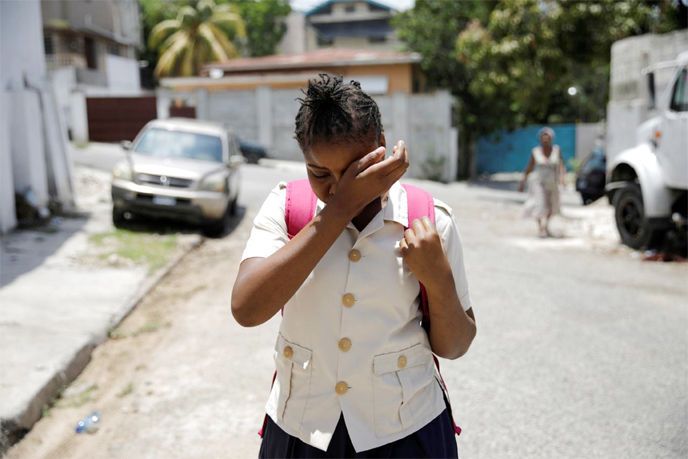
Reuters, Port-Au-Prince :
Haiti’s school children missed class this year first due to months of violent unrest, then the coronavirus pandemic. Now, as schools are finally reopening, many parents can no longer afford it, raising the prospect hard-won gains in education could be lost.
“The deadline to pay is next Monday. Without paying, I won’t be able to attend the class,” said Nickerla Etienne, 16, through streams of tears, after being sent home from her private school in the capital, Port-au-Prince, for failing to pay up.
While the pandemic has disrupted education worldwide, the situation is especially acute in Haiti, where just an estimated two-thirds of adults can read and write.
“We’ve never seen a crisis quite on this scale before,” said Beatrice Malebranche at United Nations children’s agency UNICEF in Haiti.
Virtual schooling has been impossible for most in the Caribbean country where more than half the population lives on less than $3 per day and has little internet and television access.
Meanwhile, given the weakness of the Haitian state, suffering from years of unrest and mismanagement, and still struggling to recover from a devastating 2010 earthquake, four out of five schools in the Caribbean nation are private.
And while fees are typically low, they have become unaffordable for many as the pandemic has worsened Haiti’s already dire economic plight.
Even families whose children have scored coveted places at public schools are struggling just to buy them stationery or decent shoes.
Outside of schooling, children risk entering the informal jobs sector, or worse, being drafted into Haiti’s gangs.
The education ministry has little firepower to tackle the problem, with it receiving 11% of the total budget down from 16%. The global average is 20% of total spending.
Haiti’s school children missed class this year first due to months of violent unrest, then the coronavirus pandemic. Now, as schools are finally reopening, many parents can no longer afford it, raising the prospect hard-won gains in education could be lost.
“The deadline to pay is next Monday. Without paying, I won’t be able to attend the class,” said Nickerla Etienne, 16, through streams of tears, after being sent home from her private school in the capital, Port-au-Prince, for failing to pay up.
While the pandemic has disrupted education worldwide, the situation is especially acute in Haiti, where just an estimated two-thirds of adults can read and write.
“We’ve never seen a crisis quite on this scale before,” said Beatrice Malebranche at United Nations children’s agency UNICEF in Haiti.
Virtual schooling has been impossible for most in the Caribbean country where more than half the population lives on less than $3 per day and has little internet and television access.
Meanwhile, given the weakness of the Haitian state, suffering from years of unrest and mismanagement, and still struggling to recover from a devastating 2010 earthquake, four out of five schools in the Caribbean nation are private.
And while fees are typically low, they have become unaffordable for many as the pandemic has worsened Haiti’s already dire economic plight.
Even families whose children have scored coveted places at public schools are struggling just to buy them stationery or decent shoes.
Outside of schooling, children risk entering the informal jobs sector, or worse, being drafted into Haiti’s gangs.
The education ministry has little firepower to tackle the problem, with it receiving 11% of the total budget down from 16%. The global average is 20% of total spending.
Spokesman Miloody Vincent told Reuters it would provide financial aid to at least 50,000 of the most vulnerable families, which will not go far in the country of 11 million.
The situation is a setback after Haiti hiked its primary school attendance rate to 84% from 76% over the last decade, said Malebranche.
While coronavirus has left Haiti relatively unscathed healthwise, the education ministry has mandated that staff and pupils wear masks. Schools must provide hand washing, even if it is just a bucket of water.

